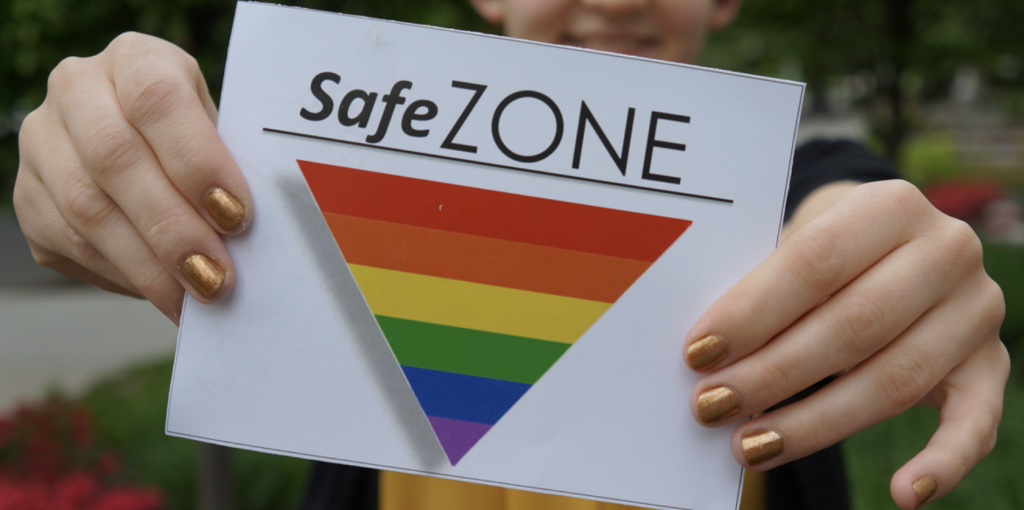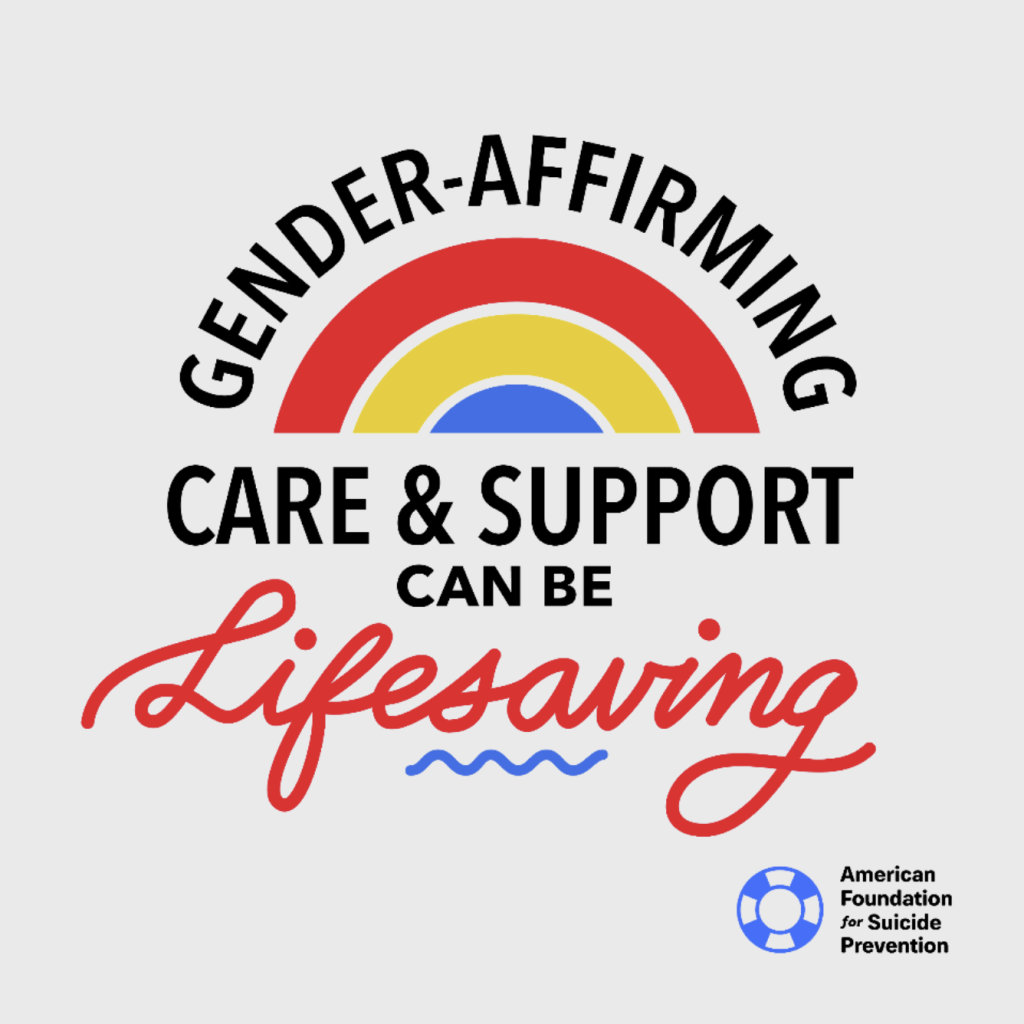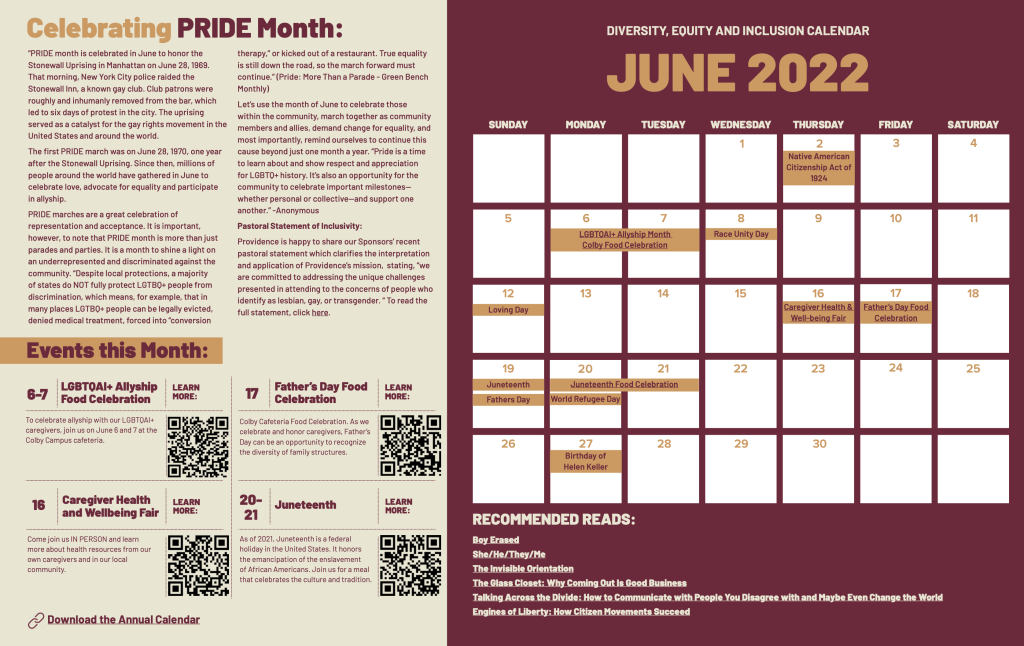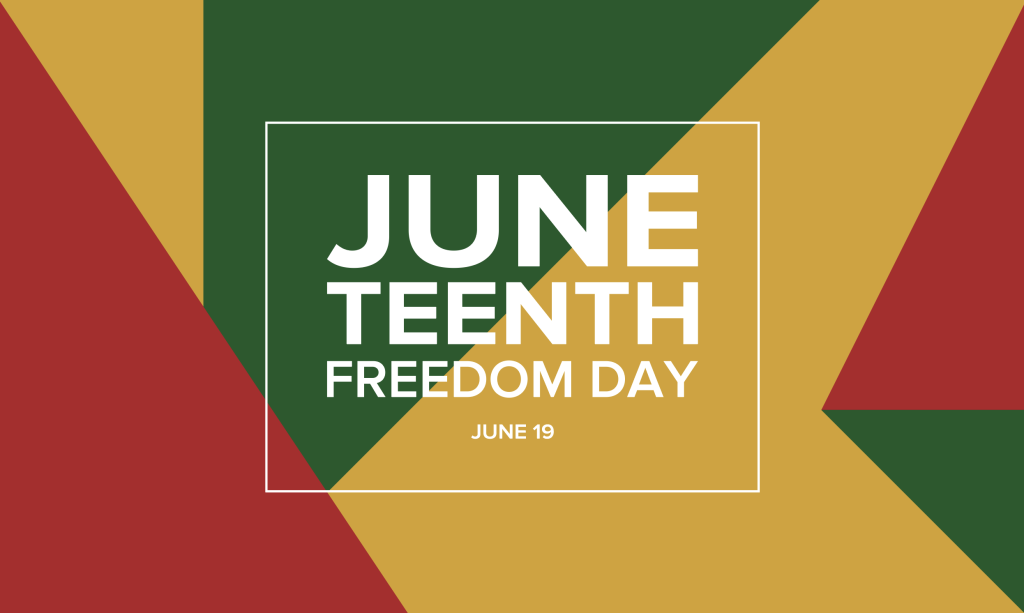Welcome to NPS’s Caregiver DEI & Well-being centered newsletter!
Thank you for being part of the positive change and implementation of diversity, equity and inclusion (DEI) to all at Providence. We’ve heard your voices and requests for access to upcoming DEI events and information to help you implement these celebrations and resources in your departments. To ease your way, we created a DEI newsletter that will be sent to you each month.
Purpose of newsletter: TO EQUIP YOU! EMPOWER YOU! TO EMBRACE THE FULL YOU!
Our goal is to aid you and your team with resources, activities, and opportunties to shine a light on different DEI celebrations each month. We hope this newsletter and calendar help take the burden off you to produce a plan to create a more inclusive environment. We want to support you in any way we can. Resources in the newsletter include:
- Access the interactive monthly multi-cultural calendar where you and your team can easily sign up to participate in different holidays/traditions we’ll celebrate
- Access to learning boards on the topic of the month, as well as pertinent videos, articles, and links
- Easy access to DEI & Well-being Grant applications to fund projects and serve your department’s DEI and well-being needs.
- Local caregiver spotlights and Diversity and Well-being Committee updates
Monthly Multicultural Calendar
To open the printable calendar, click on the image above. The digital calendar is located here: DEI Calendar
Our monthly Multicultural Calendar is a guide to the holidays of the month, as well as events/celebrations the DEI team has planned. Each calendar has QR codes that link to flyers with more details about each event. If you need assistance implementing any of these projects, have questions about the event, or want to share pictures of how your department celebrated, please email [email protected].
Each month, there’ll be an overall theme we’d like you, as a department lead, to focus on with your team. We’ve provided Learning Board materials, links, videos, recommended actions and more. This month, the focus is on LGBTQAI+ Allyship.
Ideas for Implementation of June’s Events:
-
- Be sure to keep an eye out at the Colby cafeteria throughout June for various DEI celebrations. Check out the DEI multicultural calendar for details.
- Appoint a departmental DEI Champion/Ambassador, someone to be responsible for checking the Multicultural Calendar and implementing events your team would like to participate in.
- Decorate your office to reflect culturally diverse holidays for that month.
- Providence Diversity, Equity, and Well-being Committee and the Health Education Promotion Team have collaborated to create a Caregiver Resource Fair on June 16 from 10 a.m.-3 p.m. next to the PRIDE crosswalk in the surface parking lot across from the Colby ED entrance. Come by to learn more about internal and external resources for caregivers, as well as celebrate PRIDE month. Our theme: Safety in Allyship
- On June 20, Providence will celebrate Juneteenth. Keep an eye out for announcements regarding exciting events.
- If you have questions about this month’s theme or would like further training opportunities for your team, please reach out to Brooke Chhina at [email protected]
- Click HERE to learn more about an exciting event held by our Working Moms Caregiver Resource Group (CRG). The event is called Refresh and Reconnect with Working Moms and will be held virtually on June 3rd from 12pm-1pm.
- Individual caregivers can order the Providence Swedish Pride shirts here. Please note: Only Providence Swedish caregivers can order Providence Swedish Pride T-shirts.

Departments/teams/clinics can place bulk orders by sending spreadsheet with T-shirt size and count and include shipping address to Jeff, co-founder, [email protected]. Jeff will send an invoice and payment link to pay for the order.
T-shirt sizes and prices:
- S-XL – $15 each
- 2XL – $16.50 each
- 3XL – $17.50 each
Deadlines to order:
- Order by 5/29 estimated ship by 6/7
- Order by 6/5 estimated ship by 6/14
- Order by 6/12 estimated ship by 6/21
- Please keep in mind that shipping to local (Seattle) addresses will take 1-2 days.
- We are proud to partner with Choke Print Shop, a Seattle-based LGBTQ-Owned Business.
- As a reminder, those who have registered to walk with Providence Swedish in the Seattle Pride Parade will be provided a Providence Swedish Pride T-shirt on the day of the Seattle Pride Parade. Caregivers are welcome to order additional T-shirts following the above instructions. Sign up to walk in Seattle Pride with Providence Swedish here.
Looking ahead:
Get started on planning for July
- Join us for the third round of the virtual yoga class, Poses with Providence, on July 19 at 7 p.m. To be added to the RSVP list, please email [email protected]
- In honor of Nelson Mandela Day on July 18, we will connect with his legacy of selflessness and giving back by hosting a non-perishable food drive at our Colby, Pacific, Mill Creek and Monroe campuses. There will be collection bins next to our DEI tables from July 1-15. On July 16, all food collected will be delivered to the Everett Food Bank on behalf of our caregivers.
- The DEI team has partnered with our Colby food services team to create DEI representation meals celebrating Bastille Day and Hijri New Year. Check out the DEI multicultural calendar for details.
Monthly Learning Board Theme & Content Resources
This month’s Learning Board theme is LGBTQAI+ Allyship. To learn about LGBTQAI+ Allyship and how to incorporate this theme into your department click here.
In-person Providence Caregiver Health and Well-being Fair!

When: Thursday, June 16, 10 a.m.-3 p.m.
Where: Next to the PRIDE crosswalk on the surface parking lot across from the Colby ED entrance.
Join us IN PERSON and learn more about health resources from our own caregivers and community organizations. To honor PRIDE month in June, the theme is “Safety in Allyship” We will celebrate Pride month throughout the day to focus on creating equitable access to resources for all.
10 a.m.: Kick off with by honoring our PRIDE crosswalk. We’ll pass out PRIDE flags, pronoun pins and have chalk available so caregivers can Chalk the Walk, by adding encouraging messages along the sidewalk.
10 a.m.-3 p.m.: Visit resource tables, enjoy giveaways and snacks. The event allows not only for a celebration of safety in allyship, but offers opportunities to meet with internal and external partners to share resources and learn from one another, and build connections. Can’t attend in person? We’ll provide virtual messages and resource sharing from the participants. Hope you can join us!
June is PRIDE Month

June is PRIDE month. PRIDE is celebrated to honor the Stonewall Uprising in Manhattan on June 28, 1969. On that morning, New York City police raided the Stonewall Inn, a known gay club. Club patrons were roughly and inhumanly removed from the bar, which led to six days of protest in the city. The uprising served as a catalyst for the gay rights movement in the United States and around the world.
The first PRIDE march was June 28, 1970, one year after the Stonewall Uprising. Since then, millions of people around the world gather in June to celebrate love, advocate for equality and participate in allyship.
PRIDE marches are a great celebration of representation and acceptance. It is important, however, to note that PRIDE month is more than just parades and parties. It is a month to shine a light on an underrepresented and discriminated against community. “Despite local protections, a majority of states do NOT fully protect LGTBQ+ people from discrimination, which means, for example, that in many places LGTBQ+ people can be legally evicted, denied medical treatment, forced into “conversion therapy,” or kicked out of a restaurant. True equality is still down the road, so the march forward must continue.” (Pride: More Than a Parade – Green Bench Monthly)
Let’s use the month of June to celebrate those within the community, march together as community members and allies, demand change for equality, and most importantly, remind ourselves to continue this cause beyond just one month a year. “Pride is a time to learn about and show respect and appreciation for LGBTQ+ history. It’s also an opportunity for the community to celebrate important milestones—whether personal or collective—and support one another.” -Anonymous
In healthcare settings, especially in clinics and hospitals, language is our primary source of communication. As a result, the words we use are extremely important. Medical professionals understanding and using inclusive terminology and sensitive identifiers commonly used by LGBTQIA+ individuals is just the beginning of creating an inclusive environment for our LGBTQAI+ community. We include here a terminology table for reference.
Ally – An ally is an individual who speaks out and stands up for a person or group that is targeted and discriminated against. An ally works to end oppression by supporting and advocating for people who are stigmatized, discriminated against or treated unfairly. For the lesbian, gay, bisexual and transgender (LGBTQ) communities, an ally is any person who supports and stands up for the rights of LGBTQ people.
Asexual – A person who does not experience sexual attraction; they may or may not experience emotional, physical, or romantic attraction. Asexuality differs from celibacy in that it is a sexual orientation, not a choice.
Assigned at Birth – Commonly utilized by trans individuals, the term illustrates that the individual’s sex (and subsequently gender in early life) was assigned without involving the person whose sex was being assigned. Commonly seen as “Female Assigned at Birth” (FAAB or AFAB) and “Male Assigned At Birth” (MAAB or AMAB).
Bisexual – A person who is attracted to members of more than one gender; does not have to be a preference for one gender over another.
Cisgender – Someone who identifies with the gender identity/expression expectations assigned to them based on their physical sex at birth.
Gay – A common term for men who are attracted to other men; also, an umbrella term used to refer to the LGBTQ community as a whole.
Gender Binary – The division of gender into two distinct and opposite categories (man and woman). The gender binary is recognized as a social construct, as there are many identities in-between and outside of these categories.
Gender Expression – The external display of one’s gender, through a combination of dress, demeanor, social behavior, and other factors, generally measured on scales of masculinity and femininity. Also referred to as “gender presentation.”
Gender Identity – The internal perception of one’s gender, and how they label themselves, based on how much they align or don’t align with what they understand their options for gender to be.
Heterosexism – The societal/cultural, institutional, and individual beliefs and practices that privilege heterosexuals and disparage LGBQ people. The critical element that differentiates heterosexism (or any other “ism”) from prejudice and discrimination is the use of institutional power and authority to support prejudices and enforce discriminatory behaviors in systematic ways with far-reaching outcomes and effects.
Intersex – A general term used for a variety of conditions in which a person is born with a reproductive or sexual anatomy that doesn’t seem to fit the typical definitions of female or male.
Lesbian – A common term for women who are attracted to other women
Pansexual – Attraction toward people of all genders, including those who identify as transgender, transsexual, androgynous, genderqueer, agender, and all other gender identifications, as well as those who do not feel they have a gender; pansexuality is often confused or intermeshed in definition with bisexuality.
Queer – An umbrella term which embraces a matrix of sexual preferences, orientations, and habits of the not-exclusively- heterosexual-and-monogamous majority; also a sexual orientation or gender identity label denoting a non-heterosexual and/or non-cisgender orientation. Also, a historically derogatory word that has been reclaimed by many in the LGBTQ community. It is important to note that many LGBTQ people continue to view this as a derogatory term.
Questioning – The process of exploring one’s own sexual orientation or gender identity, investigating influences that may come from their family, religious upbringing, and internal motivations.
Same Gender Loving (SGL) – 1. A term used by members of the Black community to express same-sex/gender attractions. 2. An alternative to Eurocentric LGBQ identities that do not culturally affirm the history of all queer communities.
Sexual Orientation – The type of sexual, romantic, physical, and/or spiritual attraction one feels for others, often labeled based on the gender relationship between the person and the people they are attracted to; often mistakenly referred to as “sexual preference”.
Transgender – An umbrella term for people whose gender identity and/or gender expression does not conform to that typically associated with the sex they were assigned at birth.
*LGBTQ Terminology – LGBTQ+ Center (wfu.edu)
Pastoral Statement of Inclusivity:
Providence is happy to share our Sponsors’ recent pastoral statement which clarifies the interpretation and application of Providence’s mission, stating, “we are committed to addressing the unique challenges presented in attending to the concerns of people who identify as lesbian, gay, or transgender. ” To read the full statement, click here
Suicide and LGBTQAI+ people:
One such health care issue that we seek to see reconciled, is the growing disparity of suicidal intent among our LGBTQAI+ population.
Educating the public about suicide – especially among vulnerable populations – is critical for raising awareness, encouraging people who need it to seek help and advocating for intervention and prevention strategies for those at risk. When we talk about suicide safely and accurately, we can help reduce it.
- Gay and lesbian people are more likely — and bisexual adults are more likely still — to report having made a suicide attempt in the past year and/or over their lifetime
- Transgender people report greater prevalence of suicide attempts in the past year and/or over their lifetime, than LGB or straight people. However, direct comparisons for these populations are limited because no single study has reported findings for all these populations
Protective factors:
- Resilience — the ability to adapt to stress and adversity — is one of several protective factors that can reduce the likelihood of suicide attempts and suicide deaths.
Other such factors include:
- Family acceptance
- Affirmation of one’s LGBT identity
- Reducing anti-LGBT stigma and prejudice
- Reducing bullying and other forms of victimization
- Access to LGBT-affirming physical and mental health care
- Legal protections from discrimination
You can support suicide prevention by joining the Snohomish County Out of the Darkness Walk on Oct. 15 at Boxcar Park, Everett. To join the team of Providence caregivers or donate to the cause, reach out to Team Captain Brooke Chhina or click HERE.
Lastly, Talk Saves Lives™ is a free resource that provides participants an understanding of suicide as a leading cause of death, including the most up-to-date research on prevention and what communities can do to save lives. Participants learn common risk factors and warning signs associated with suicide and how to keep themselves and others safe.
In addition to the standard presentation, three specialized modules are available, focusing on specific at-risk communities: LGBTQAI+, seniors and firearms. The standard Talk Saves Lives presentation, and the Seniors module are also available in Spanish. Visit afsp.org/talksaveslives. Brooke Chhina, an official Talk Saves Lives presenter, is available to give this presentation to your team, either virtually or in person. Please email [email protected]
June 19 is Juneteenth
As of 2021, Juneteenth is a federal holiday in the United States. It honors the emancipation of the enslavement of African Americans. On June 19, 1865, freedom for those enslaved was proclaimed in Texas, the last Confederate state with institutional slavery. President Abraham Lincoln actually issued the emancipation proclamation two years earlier, but due to intentional and unintentional efforts to hide the abolishment of slavery, thousands of Black and African American individuals did not see nor hear of their liberation till months and years later. it took that long for the thousands of enslaved Black Americans to hear of their liberation.
How to celebrate Juneteenth in your department and at home:
Participate in local events:
- Snohomish County Juneteenth Events 2022
- Juneteenth Monroe Celebration
- Juneteenth with Atlantic Street Center and Rainier Beach Community Center
Support local Black and African American businesses:
- Grandma’s in the Kitchen, Everett
- Touba’s Bakery, Everett
- Golden Fleece Billiards, Everett
- Kids Kuts, Everett
- Scooby’s Dogwalkin, Everett
Donate to charities that support Anti-Racism Equity and Equality such as:
- Black Youth Project
- Loveland Therapy Fund
- Amistad Law Project
- Agape African Senior Services Center
- Soil Generation
- Womanist Working Collective
Tell Your Story
Providence caregivers represent an array of diverse backgrounds, cultures, belief systems, circumstances and more. It’s a privilege to work for an organization where we can learn from one another if given a chance. This section of our newsletter is one of those chances. Below is a list of upcoming holidays, celebrations, and monthly themes. If you have a personal connection to any of these topics (or if you have another DEI/Wellness story unrelated to these topics) and feel comfortable sharing, we’d love to hear from you. Please reach out to [email protected] for more details. Those who participate will receive a gift for their time and energy. 😊
- July: Bastille Day
- Hijri: New Year
- August: World Indigenous Peoples Day
- September: Hispanic Heritage Month
- September: Suicide Prevention Month
- October: Diwali
- October: World Mental Health Day
- October: National Coming Out Day
Additional Team Resources
- If you or anyone in your department is interested in learning more about DEI and Well-being, or would like to participate in our action planning, please email [email protected] about joining our Diversity and Well-being Committee here at Providence.
- For additional resources about DEI and caregiver wellness, click here to be sent to our Caregiver Resource Hub.
Quote Corner
- “It takes no compromise to give people their rights … it takes no money to respect the individual. It takes no political deal to give people freedom. It takes no survey to remove repression.” – Harvey Milk
- “When all Americans are treated as equal, no matter who they are or whom they love, we are all more free.” – Barack Obama
- “This world would be a whole lot better if we just made an effort to be less horrible to one another.” ―– Elliot Page
- “There’s nothing wrong with you. There’s a lot wrong with the world you live in.” – Chris Colfer
- “If I wait for someone else to validate my existence, it will mean that I’m shortchanging myself.” – Zanele Muholi
- “Gay rights are human rights.” – Hillary Clinton
- “To be yourself is truly a revolutionary act, and I think more and more people should try it, because it’s gotten me a pretty cool life.” – Lena Waithe
Diversity Cooking Class – A monthly recipe highlighting the cuisine of culture’s from around the world.

June: Sorrel (Hibiscus) Tea
Ingredients:
- 2 cups dried hibiscus (sorrel) flowers
- 1⁄3 cup peeled fresh ginger slices (¼ inch thick)
- 2- to 3-inch cinnamon stick
- 6 whole cloves
- ¼ cup grated orange zest
- Grated zest and juice of 1 lemon
- Demerara sugar, honey, or agave nectar
- Mint leaves, for garnish
Instructions:
- Instructions:
- In a large saucepan, bring 2 quarts water, the hibiscus, ginger, cinnamon, cloves, and orange and lemon zests to a boil over medium heat. Boil for 5 minutes. Remove from the heat. Add the lemon juice, cover tightly, and let stand for 1 to 2 days at room temperature. Strain and discard the solids. Sweeten to taste with demerara sugar, honey, or agave nectar.
- Chill thoroughly. Serve over ice and garnish with mint.
Hosted By:
-
- Kaila Alvarez, Diversity Equity & Inclusion Manager: [email protected]
- Brooke Chhina, Diversity Equity & Inclusion Committee Lead: [email protected]
- Jessica Burt, PIHC Program Ops Manager, Community Health and Caregiver Equity & Well-being: [email protected]





